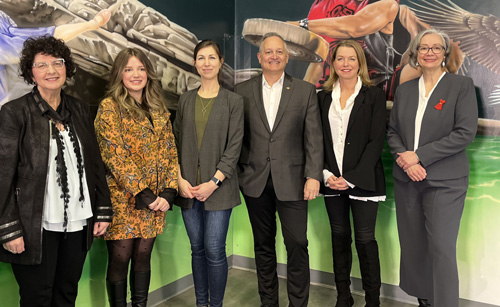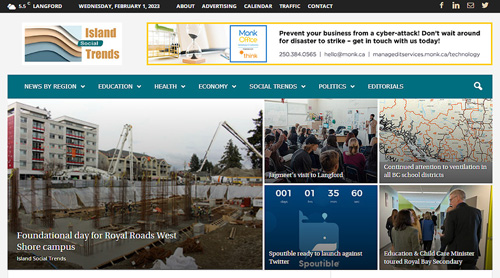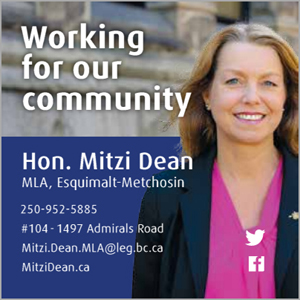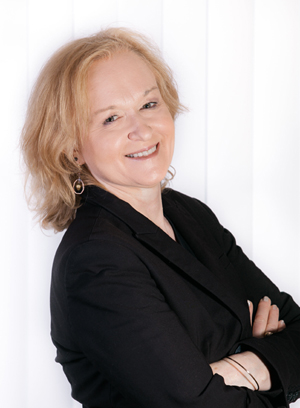Thursday February 2, 2023 | LANGFORD, BC [Updated 2 pm]
by Mary P Brooke | Island Social Trends
More Integrated Child and Youth (ICY) teams were announced today by Minister of Mental Health and Addictions, Jennifer Whiteside, together with Mitzi Dean, Minister of Children and Family Development.
They were speaking at the Mission Youth Centre in Mission in the BC Interior today, for this announcement about child and youth mental-health and substance-use supports coming to several communities in British Columbia.

The combination of supports by counselling professionals and peer supports aims to help children, youth and families to benefit from seamless mental-health and substance-use services.
ICY presently serves five school district communities, and with today’s announcement of seven more, that brings the total to 12. The promise from Minister Whiteside today is a commitment of $55 million in funding to implement teams in 20 school districts by 2024, to be fully operational in 2025.
Progress so far:
“When a child or youth is struggling with their mental health and with substance use, we know how vital it is to provide them with the supports they need,” said Mitzi Dean, Minister of Children and Family Development.
“This is why our government is working together with integrated teams in seven more school districts across our province, to bring even more services to youth where they feel most comfortable: in schools, homes or community settings.”
Today Minister Dean said that under her leadership over the past five years, that there are now fewer child in care (by government), particularly from among Indigenous communities. She worked to help restore governance of care back to First Nations leadership, as announced last fall.

“When a child or youth is struggling with their mental health or substance use, we want them to get services where they feel most comfortable. I’m so pleased to be part of our government’s ICY Teams initiative, working with schools and communities to bring even more services to youth,” said Dean on her Twitter feed today after the event.
Hiring more staff:
Hiring more staff is part of the work to setting up the ICY services, together with assessing the supports that are already in place. Peer support counselling is also part of the mix.
South Vancouver Island not yet on the list:
So far, the ICY program is not listed for any of the school districts on South Vancouver Island (that would be SD61 Greater Victoria, SD62 Sooke and west shore, SD63 Saanich and SD79 Cowichan Valley).
Today Minister Whiteside did not specifically say why the south island school districts are not yet in the loop. If services are already considered to be adequate, this was not directly answered by the Minister; overall, it sounds like there are areas of greater need elsewhere in the province.
However, based on what some parents are saying in social media chat, the Greater Victoria west shore and south island region is not immune to the problems of stresses that lead to mental health issues.
Where the program operates now:
Currently the program is operational in Richmond, Coast Mountains (Terrace and Hazelton), Okanagan-Similkameen (Oliver and area), Maple Ridge-Pitt Meadows and the Comox Valley, bringing the number with ICY teams to 12. The Province has committed funding to implement teams in 20 school districts by 2024 to be fully operational by 2025.
These seven school districts join Richmond, Coast Mountains (Terrace and Hazelton), Okanagan-Similkameen (Oliver and area), Maple Ridge-Pitt Meadows and the Comox Valley, bringing the number with ICY teams to 12. The Province has committed funding to implement teams in 20 school districts by 2024 to be fully operational by 2025
The new multidisciplinary teams are being added in Fraser-Cascade (Hope, Harrison, Agassiz), Kootenay-Columbia (Trail), Mission, Nanaimo-Ladysmith, Okanagan-Shuswap (Salmon Arm), Pacific Rim (Port Alberni) and Powell River school districts.
How it works:
School districts are used as the central base from which to roll out a program.
As stated by government today, the new teams will connect children, young people and families to counselling, peer and cultural supports, meeting young people where they feel most comfortable: in schools, homes or community settings.
“Integrated Child and Youth teams make is easier for young people and their families to connect to the care they need, where and when they need it,” said Jennifer Whiteside, Minister of Mental Health and Addictions. “Integrated Child and Youth teams fill gaps and better co-ordinate mental health, wellness and substance-use care in schools and in the community, making it easier for families to access the help their child needs.”
Team members may include clinical counsellors connected to schools, youth substance-use clinicians, child and youth mental-health clinicians, Indigenous Elders or workers supporting Indigenous children and youth, as well as family and youth peer supports. Members of these multi-disciplinary teams work together to provide a range of supports, including assessment and screening, consultation and therapeutic services to children up to 19 years old.
Today Minister Whiteside said that school district budgets would not be impacted (as in having to pay for more professional counsellors, for example).
Integrated Child and Youth teams provide services to all children, youth and families within a school-district boundary, including those attending First-Nations-operated schools, independent schools, francophone schools, alternative schools or those not in school.
Children and youth can connect with ICY teams through various points of contact, such as early years services, school staff, primary care, mental-health and substance-use services, Foundry centres and Indigenous-led organizations.
Mental health important to educational success:
“We have heard from students how important their mental health is to their educational success and overall health and well-being,” said Rachna Singh, Minister of Education and Child Care.
“Having the Integrated Child and Youth teams working so closely with districts means that children, youth and families will have greater access to additional supports during the vulnerable years of their child’s life,” said Singh in the government’s news release today.
Some quick facts (from BC Ministry of Mental Health and Addictions):
- Approximately 75% of serious mental-health issues emerge before the age of 25.
- The COVID-19 pandemic has disproportionately affected children and youth, particularly people with pre-existing challenges.
- In BC, nearly 12.7% of children between four and 18 years are affected by mental-health disorders, and 44.2% of those receive services.
===== RELATED:
Indigenous self-government in child and family services (Nov 3, 2022)
Outgoing SD62 board (2018-2022) sticks to its guns on counselling directions (Oct 25, 2022)
Mental health requires more focus in SD62, says high school teacher (Mar 4, 2021)
School mental health supports topped up & enhanced during COVID (Sept 2, 2020)

===== ABOUT THE WRITER:
Mary P Brooke, B.Sc., Cert PR is a long-time journalist, delivering news through a socioeconomic lens through Island Social Trends.
Based on the west shore of south Vancouver Island, her publication IslandSocialTrends.ca covers news of the Greater Victoria area, south Vancouver Island, with insights on BC and national issues.
Ms Brooke has consistently covered SD62 news at the board and committee level since 2014. Mary Brooke was a school trustee candidate in SD62 Belmont Zone (Langford, Colwood, Metchosin, Highlands) in October 2022.
===== ABOUT ISLAND SOCIAL TRENDS:
Island Social Trends emerged in mid-2020 from a preceding series of publications by founder/editor Mary P Brooke and published by Brookeline Publishing House Inc. The series is, so far: MapleLine Magazine (2008-2010), Sooke Voice News (2011-2013), and West Shore Voice News (2014-2020), and Island Social Trends (2020 to present). | ARCHIVES: POLITICS | HEALTH | EDUCATION | SD62 West Shore










